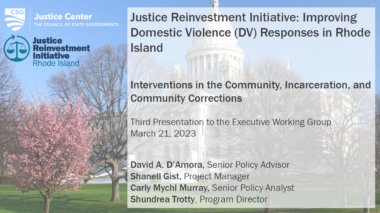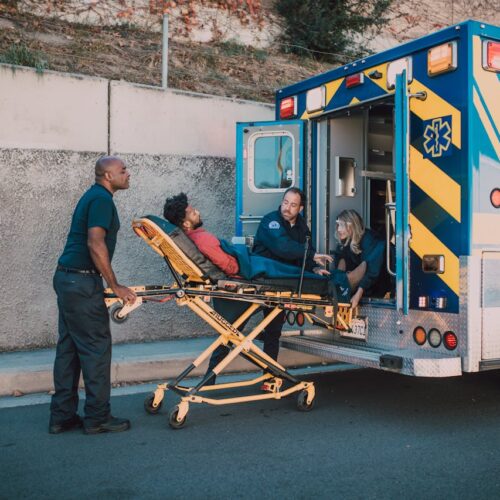
Executive Working Group Meets to Discuss Community Intervention and Correctional Responses to Domestic Violence in Rhode Island
On March 21, 2023, CSG Justice Center staff presented analyses of Rhode Island’s community intervention and correctional responses to domestic violence to the Rhode Island Domestic Violence Executive Working Group. These findings conclude the analysis of Rhode Island’s domestic violence responses as part of the state’s bipartisan, interbranch Justice Reinvestment Initiative, which began last year.
The analyses highlighted at the meeting were informed by interviews and focus groups with representatives from Batterers Intervention Programming; the Center for Health and Justice; community health agencies; Department of Behavioral Healthcare, Developmental Disabilities, and Hospitals; Department for Human Services; Health Equity Zones; the Rhode Island Coalition to End Homelessness; the Veteran’s Administration; and the Department of Corrections. Key insights are summarized below.
- Treatment interventions, including Batterers Intervention Programming, are challenged by state disinvestment, a lack of resources to provide targeted services, and minimal oversight due to lack of infrastructure.
- Domestic violence training varies among treatment providers and Department of Corrections staff.
- Lack of partnerships and information sharing within and among intervention service providers and state agencies results in siloed responses to domestic violence.
- Geographic and financial barriers cause inequitable access to and provision of services.
- Probation and parole officers are limited in what resources and supports they can provide to people who have committed domestic violence or been victimized by it.
- Domestic violence-specific risk and need assessments are not conducted.
- Resources are limited for individuals who have committed or experienced domestic violence and are incarcerated.
The next presentation, which will focus on policy and practice recommendations, will take place in May 2023.
This project was supported by Grant No. 2020-ZB-BX-0022 awarded by the Bureau of Justice Assistance. The Bureau of Justice Assistance is a component of the Department of Justice’s Office of Justice Programs, which also includes the Bureau of Justice Statistics, the National Institute of Justice, the Office of Juvenile Justice and Delinquency Prevention, the Office for Victims of Crime, and the SMART Office. Points of view or opinions in this document are those of the author and do not necessarily represent the official position or policies of the U.S. Department of Justice.
About the author

In response to growing calls for police reform in New Jersey, particularly following the shootings of Najee Seabrooks…
Read More Three Things to Know About New Jersey’s Groundbreaking Community Response Legislation
Three Things to Know About New Jersey’s Groundbreaking Community Response Legislation
In response to growing calls for police reform in New Jersey, particularly following the shootings of Najee Seabrooks and Andrew Washington in March and August 2023, a coalition of law enforcement officials, mental health professionals, and community advocates partnered to explore public safety response alternatives.
Read More Apply Now: Join a Learning Community for Community and Crisis Response Teams to Improve Responses to Youth
Read More
Apply Now: Join a Learning Community for Community and Crisis Response Teams to Improve Responses to Youth
Read More















